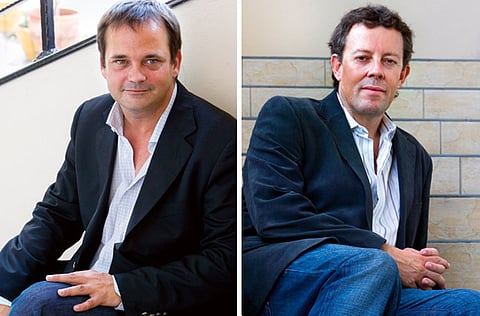Meet the founders of Mideast Posts
4men caught up with David Westley and James Mullan, the duo behind Mideast Posts

How would you define Mideast Posts?
David: We envisioned Mideast Posts as a virtual gathering place for voices from the Middle East. We realised a while ago that there was no singular journalistic and community voice emanating from the region.
James: To borrow and tweak an old adage, it's of the people, for the people, by the people. It's not a new model, but hadn't been done regionally prior. We decided we could do it, and did it.
What made you realise the need for such a collective?
David: Much of the content in regional broadsheets and websites is pulled from US newswires, which are written by, and for, US citizens of a particular economic class and world view. We wanted an approach where bloggers and commentators write about their societies, communities and experiences first-hand, and so launched Mideast Posts in November 2010.
James: We realised the global news narrative was incomplete. The voices of Palestinians in the West Bank, Bahrainis in Manama, Syrians in Damascus and Jordanians in Amman were missing. The world is more complex than can be depicted in content tailored to the preferences of middle-class Americans.
How did you go about building a contributor base?
David: We wanted individuals who had a point of view, and could express it well. We initially went looking for them - on other sites, through word of mouth, and by trawling popular blogs and aggregators. Later, as we grew, bloggers started approaching us with ideas. At the outset, our biggest fear was there might not be many regional voices interested in speaking out. As it turns out, that was an utterly unfounded concern.
James: It took us just two months to realise there were a plethora of regional voices wanting to express themselves. Bloggers, writers and community members have been eager to share their experiences of ongoing events, some for the first time. We've had people in Egypt's Tahrir Square using Mideast Posts to narrate their experiences first-hand.
You follow the Huffington Post model in that you don't pay your bloggers. How does writing for your site help contributors?
David: We believe the more bloggers put into the platform, the more they get out of it in terms of publicity and a higher profile. In fact, some of our bloggers are saying traffic to their personal sites has risen by over 100 per cent since they've started contributing to Mideast Posts.
James: On the one hand, Mideast Posts gets bloggers' viewpoints and writing to a wider audience in a systematic manner. On the other, it's almost a matchmaking service for bloggers who share a commonality of viewpoints, want to get in touch, or want to conduct business and work on collaborative projects.
Does the Mideast Posts have commercial interests? If so, do you believe commercial rewards should be passed to contributors?
David: We certainly do owe our bloggers, and believe they certainly should be rewarded. But for now, the Mideast Posts site is being run as a non-profit concern, and is not commercial. If we find a way to meaningfully monetise the site, we'll certainly be looking at ways our bloggers can also derive benefit from it. Having said that, most bloggers are not motivated by financial reward. They're looking for their viewpoint to be heard, and want an audience for their writing. We offer that.
James: It's true that the Mideast Post site was conceived as a community project. At the same time, we would at some point like to earn revenue that will potentially allow us to hire editors, find researchers, and even compensate some writers.
Are there any plans to make the Mideast Posts commercially viable?
David: As James said, there's only so much that can be done before financial constraints kick in. Both he and I are ploughing as much time as we can on keeping Mideast Posts up and running. But after a certain critical mass, some manner of proper structure becomes imperative.
James: Ideally, we would like to find a benefactor or sponsor who would like to see the growth of indigenous regional content in both Arabic and English. The Arab world is 15-20 per cent of the global population, but generates less than 1 per cent of the content. Of course, we'd ensure that financial considerations don't interfere with our remit of promoting relevant and interesting viewpoints.
You mentioned Arabic content. Isn't Mideast Posts primarily an English site?
David: We're working hard on launching an Arabic version. We've already got an editor and a team of contributors. We'll be going live within the next four to eight weeks. The Arabic site is not a translated mirror of the English one, but has its own original content and contributors.
James: It's probably been easier to find contributors for the Arabic site due to the positive response the English one has garnered.
What does the future hold?
David: We're very pleased with what we've accomplished thus far, with 40 contributors in English and 25 in Arabic. Our largest audience, strangely, is from the United States, where people are obviously looking for viewpoints alternative to mainstream media. Our site's traffic has been consistently increasing by 20 per cent month on month. But we're reaching the upper limits of how much we can accomplish alone. The next step is to find financial help.
James: The immediate next step is obviously to launch the Arabic site. Post that, we're going to have to seriously consider ways to find capital to put a team in place so we can keep growing.



